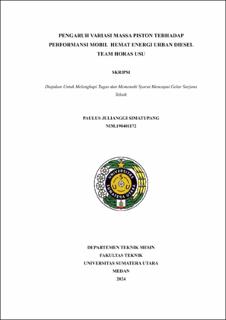Pengaruh Variasi Massa Piston Terhadap Performansi Mobil Hemat Energi Urban Diesel Team Horas USU
The Effect of Variations in Piston Mass on the Performance of Energy Saving Cars Urban Diesel Team Horas USU

Date
2024Author
Simatupang, Paulus Julianggi
Advisor(s)
Nur, Taufiq Bin
Metadata
Show full item recordAbstract
The progress of a country can be seen from the way people use and utilize modern technology well and efficiently. The higher the level of people's movement, the more they will need superior means of transportation that are fuel efficient and environmentally friendly. However, due to people's dissatisfaction with the superiority of transportation equipment, ideas arose to modify machine components so that they could meet their needs. Modification activities were carried out by changing or adding parts to machine components. The USU Horas Team developed an efficient vehicle to save fuel and be environmentally friendly through piston modifications applied to the USU Horas Team Urban Diesel car. The piston is the main part in the engine that works reciprocatingly and converts heat energy into motion. This research aims to analyze the performance of the Team Horas USU urban diesel car and the parameters used to determine the performance of the Team Horas USU urban diesel car are torque, power, specific fuel consumption, thermal efficiency and exhaust emissions. The maximum torque from the dynotest test results is 9.9 Nm at a rotation of 1000 rpm using a piston component with a mass of 210 grams. The maximum power obtained is 2.08 KW for a piston with a mass of 210 grams at a rotation of 3000-3200 rpm. Then for the piston with a mass of 210 grams, it gets more economical fuel consumption than a standard engine and the highest thermal efficiency is 35.11% on a piston with a mass of 210 grams at 3000-3200 rpm for carbon monoxide and hydrocarbon exhaust emissions on a piston with a mass of 210 grams lower percent
Collections
- Undergraduate Theses [980]
